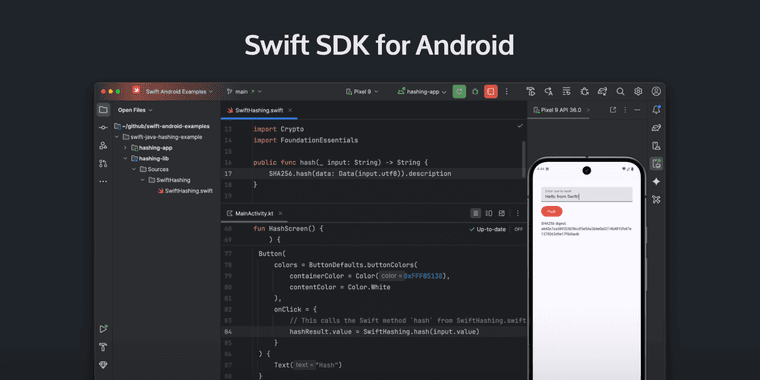Annotation
- Introduction
- Swift Android SDK Availability
- Getting Started with Swift on Android
- Swift's Growing Platform Support
- Pros and Cons
- Conclusion
- Frequently Asked Questions
Swift SDK for Android: Build Native Apps with Apple's Language
Swift SDK for Android enables native app development with Swift, supporting code sharing between iOS and Android platforms.

Introduction
Apple's Swift programming language has expanded to Android with the Swift SDK, enabling native app development and code sharing between iOS and Android platforms.
Swift Android SDK Availability
Joannis Orlandos launched the first nightly preview of the Swift SDK for Android, allowing developers to leverage Swift's modern syntax and safety features. The SDK supports Windows, Linux, and macOS, facilitating integration with various IDE tools.
Getting Started with Swift on Android
A comprehensive guide helps set up Swift development for Android, enabling code testing on devices. It assists with configuring build tools and package managers for smooth integration.
Swift's Growing Platform Support
This release marks Swift's evolution into a cross-platform language, supporting cloud, web, Windows, and embedded devices. Android compatibility enhances its role in streamlining workflows across operating systems.
Pros and Cons
Advantages
- Enables code sharing between iOS and Android platforms
- Leverages Swift's modern syntax and safety features
- Supports multiple operating systems for development
- Provides access to Android's native capabilities
- Reduces learning curve for iOS developers
- Expands Swift's ecosystem beyond Apple devices
- Facilitates unified mobile development approach
Disadvantages
- Currently in preview stage with potential instability
- Limited community resources and documentation
- Requires adaptation of existing Swift packages
- May have performance overhead compared to native Java
- Integration challenges with existing Android tooling
Conclusion
The Swift SDK for Android advances cross-platform development, allowing Swift's use on both major mobile platforms. It promises reduced duplication and better workflows, with growing tooling support for debugging tools and version control systems.
Frequently Asked Questions
What is the Swift SDK for Android?
The Swift SDK for Android is a development kit that enables programmers to build native Android applications using Apple's Swift programming language, allowing code sharing between iOS and Android platforms.
Is the Swift SDK for Android production-ready?
Currently, the Swift SDK for Android is available as a nightly preview release, meaning it's still in early development stages and may not be suitable for production applications yet.
Which operating systems support Swift Android development?
The Swift SDK for Android supports development on Windows, Linux, and macOS systems, providing flexibility for developers using different operating environments.
How can developers get started with Swift on Android?
Developers can download the Swift SDK from the official repository and follow the getting started guide to set up their development environment for Android targets.
What are the main advantages of using Swift for Android?
Main advantages include enabling code sharing between iOS and Android, leveraging Swift's modern syntax and safety features, and reducing the learning curve for iOS developers.
Relevant AI & Tech Trends articles
Stay up-to-date with the latest insights, tools, and innovations shaping the future of AI and technology.
Stoat Chat App: Complete Guide to Revolt Rebranding and Features
Stoat chat app rebranded from Revolt due to legal pressures, maintaining all user data, features, and privacy focus without any required actions from existing users for a seamless transition.
Zorin OS 18: Modern Linux OS with Windows App Support & New Features
Zorin OS 18 is a Linux distribution with a redesigned desktop, enhanced Windows app support, and web apps tool, ideal as a Windows 10 alternative with long-term support until 2029.
AV Linux 25 & MX Moksha 25 Released with Enhanced File Manager & VM Features
AV Linux 25 and MX Moksha 25 are new Linux releases based on Debian Trixie, featuring enhanced file management with Quickemu and YT-DLP integration, tailored for multimedia production and lightweight computing.